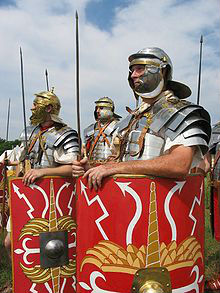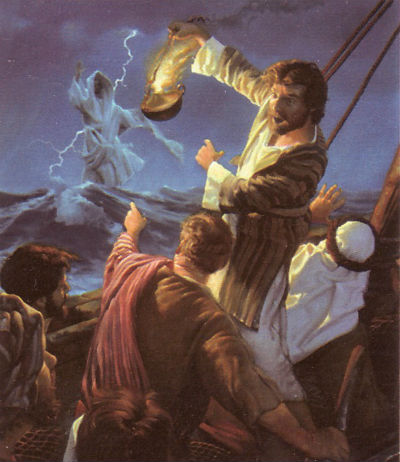 Time to think is becoming rarer.
Time to think is becoming rarer.By Neil Earle
 Time to think is becoming rarer.
Time to think is becoming rarer.In the 1960s we had a Broadway play titled, “Stop the world I want to get off!” After the summer of 2014 some people may think it needs to be re-released.
What a summer! Beheadings, crucifixions, invasions, proxy wars, urban warfare, bombings, murders, hybrid war in the Ukraine, rockets and bombings and more bombings.

Christians are not detached from these things, as the bad news coming out of Iraq about merciless assaults on them has shown. Here in the West we learned years ago that “bad news makes people feel bad.” Seems obvious. But rather than bury our heads in the sand or in our text messages and shutting the world out, Christians have available to them the supreme, deeply revivifying Example of the Man from Galilee to study and to ponder.
Jesus was a man raised amid a fearsome crisis for his people and his nation. It was a community under threat ruled by maniacal bloodthirsty dictators (Matthew 2:16-18). The Roman occupying presence was everywhere, and no one likes to be occupied (John 11:48). The sacred religion of Judaea’s ancestors had been corrupted by moneychangers and cynical merchants. Sickness appeared to be epidemic (Mark 1:32-34) and poverty makes its appearance in his most well-known parables (Luke 15:8-10). Brutality was commonplace.
For all that, my teacher Gordon Fee used to say that people knew two things about Jesus: He died on a cross and he told marvelous stories – stories with a kick to them called parables.
 So who's got stress? With Roman soldiers everywhere Jesus was hardly living in a fairy-tale world.
So who's got stress? With Roman soldiers everywhere Jesus was hardly living in a fairy-tale world.But Jesus was also a lot lot more. He was a man from God but a man with a plan, he was an organizer, a trainer and motivator of men and women (Matthew 4:18-22). He was also an exponent of realistic life principles that rank with the best business zingers we have – “sufficient to the day is the evil thereof,” “your pound has gained ten,” “unprofitable servants – you have done only what was commanded.”
His parables and teaching reflect a concrete, pictorial down-to-earth approach to life. Where we preachers often harrumph about “civic virtue” Jesus stated “Give Caesar what is Caesar’s and God what is God’s.” While we often ramble on about “trust,” Jesus said simply “Behold the birds.” While we talk exaltedly about God’s superintending Providence, Jesus brilliantly advises “the very hairs of your head are numbered.” While we complain of how hard it is to be good, Jesus talked about “squeezing through the narrow gate.”
A writer named H. H. Horne summarized these principles for us in a helpful little book titled Teaching Techniques of Jesus. Jesus not only spoke brilliantly he worked mighty skillfully in the three years he had to teach and train his followers in the ways of the Kingdom. Mark 1:29 shows him healing people and then getting up very early in the morning to go out by himself all alone to pray. When the disciples finally found him and told him what kind of crowds there were waiting in Capernaum he seemingly nonchalantly told then – “Nope. I must move on. I’ve got other people to reach.”
Jesus knew the Law of Priorities – do not be distracted from the goals you have set for yourself. In Mark 1 Jesus showed his determination to expose as many as possible with his core message, “Repent, for the Kingdom is at hand.”
Matthew 14:23 shows us Jesus knew how to “unplug,” a phrase people are using today to help those of us becoming slowly addicted to our machines. There is another way to go (see box). “When the crowd dispersed he climbed the mountain so he could be by himself and pray. He stayed there alone, late into the night” (The Message).
Note that before this Jesus had, executive-like, sent the crowds away and calmly dismissed his disciples. A Man with a Plan. But the core element of that Plan was prayer – staying in contact with his Power Source, His Father in heaven. He could do nothing without that divine help mediated through the Holy Spirit (John 5:19).
Remember, he began his ministry with forty days in the wilderness – alone and tempted by the devil (Matthew 4). Jesus knew how to spend much time alone – even getting away for a break when the time called for it (Mark 6:31).
He knew how to unplug.
How can we keep this sense of life’s priorities in view with all that’s crowding in on us from the media and the culture? How to accomplish our goal of helping advance the Kingdom in a world with its own agenda and that screams for our attention? Here are three things to think about.
 Jesus walked on water sometime between 3:00 and 6:00 in the morning.
Jesus walked on water sometime between 3:00 and 6:00 in the morning.We too have to keep vigil with God. Here’s one suggestion to “redeem the time” (Galatians 6:10). How about stopping eating at 6:30 PM, then turning off the TV and computer. Sit down in a quiet place and commune with God, just him and your Bible. With no snacks or food you may well toss and turn that night but you will survive, and some of that disruption will be God speaking to you – coming to you in the night watches (Psalm 63:6).
Did you ever notice at what time Jesus appeared on the Lake, walking on the water? It was in the fourth watch of the night – that’s between 3 and 6 AM (Matthew 14:25). Imagine! Jesus was either up late or up early – it depends how you look at it. Good things can happen when the Spirit disturbs our sleep. Don’t fight it. Take out the Book of Psalms and let its calm assurance help you get back to sleep. One of my friends says, “Don’t count sheep, commune with the shepherd.”
This is called ‘waiting on the Lord” in the psalms (Psalms 27:14).
I’m happy to report that some are trying this suggestion and it is working. We have to get the advantage over this hyped-up, over-communicated world moving at the speed of Twitter – we can’t let it squeeze us into its shape.
Here at home we can take part in community actions that are going begging – volunteering at a library, signing up for Meals on Wheels, working at a food bank over the holidays. These are things that will require us setting priorities.
You will think of other things but the main thing is not to let this world push us around with its seemingly insatiable demands and its everlasting bad news. We all need to be spiritually reignited. John Stott said this: “The truth is that everything old has to be freshened if it is to remain new. Old silver must be polished, old friendships kept in good repair, old memories revived, old resolutions repeated and old truths recovered” (Christ the Controversialist, page 39).
Don’t be the one at your workplace or on your block or in your apartment who is the crank or the odd person out. If this has happened make amends. Humble the self. Offer a gift or a card to express contrition. I’ve had to do this many times in 42 years of ministry, believe me. Moderation in all things is St. Paul’s watchword. Even in using the Internet there are ways to use it well. Sin is not the thing but the wrong use of the thing, St. Augustine said.
Jesus used his 33 years so skillfully that he changed the world through the men he had trained. He was resolute, hard-working, sometime people pressed on him so he couldn’t even eat. But he also knew when and how to unplug, and even in this he shows us once again he was, truly, the Master. Let’s follow him.